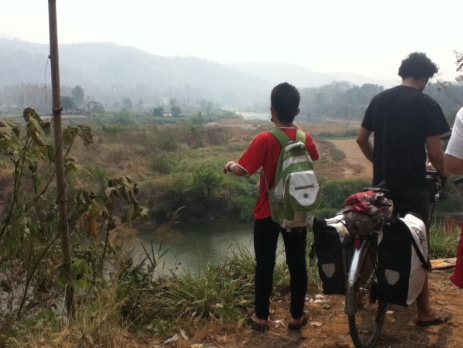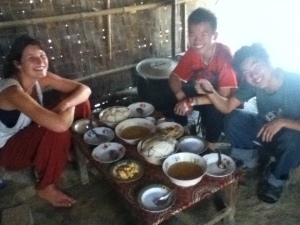Last night I was rape-kissed by a ladyboy, chased by mall cops, met a former Bon Jovi drummer who has returned from the dead, and discovered that it is possible for a woman to write using only her vagina.
I pressed the tuk-tuk driver on this last one. He was trying to lure us to one of Bangkok’s infamous ping-pong shows, where feats of vaginal dexterity shock and titillate the dregs of the tourist world. He handed me a card listing the various acts on the bill, every one of them preceded by the word “pussy” and all of them horrifying to imagine. (Pussy razor blades?) Aside from the obvious question about what sort of training a woman must undergo to start on such a career path, which the tuk-tuk driver could only shrug at, I wanted to know what sorts of things these women write with their vaginas. Poetry? Reflections on misogyny and the fetishizing of genital mutilation?
“Letters,” he said, “like, ‘Dear John, how are you? I love America.'”
The art form, apparently, is still in its infancy. Who knows, though? Maybe some enterprising feminists can co-opt this kind of lunacy and scare the hell out of misogynists everywhere by writing anti-patriarchal missives using only their genitalia.
I went to Khao San to help a new Canadian friend find a bookstore. He wanted to read Hemingway. Imagine walking down that infamous road, seething with drunkards, whores, pimps, and pushers of every illicit substance and brand of degeneracy invented by man, looking for a book shop.
Siren calls from every direction:
“Tuk-tuk? Where you going? You want boom-boom? Lady massage?”
“Hey man, what you looking for? Opium? Valium?”
“Hello, where you from? You handsome man.”
Such vultures speak English as long as you remain within the bounds of narrowly defined scripts. Haggling over the cost of a T-shirt or a prostitute, sure, no problem. Flawless English. Ask for a bookstore and you’ll get a blank look. Repeat it several times and they’ll nod as though they suddenly understand, then try to push you into the tuk-tuk. (God knows where that tuk-tuk would take you.) The only way to avoid all of these attempts to lighten your wallet and corrode your soul is simply to ignore them. My Canadian buddy told me to try speaking a language they wouldn’t understand, or even pure gibberish. So when a ladyboy grabbed me, I gave it a shot.
“Ooh, you handsome man, where you from?”
<<Я не говорю по английски.>>
“Huh?”
<<Вы не понимаете? Вы не говорите на русском?>>
“I no understand. How are you?” (Here s/he caresses my shoulder with one hand and tries to grab my junk with the other.)
<<Простите, я только хочу хорошую литературу. Где находится книжный магазин?>>
And without further preamble, s/he grabbed the back of my head and rape-kissed me, forcing her tongue past my clamped lips while I tried to push her away. S/he was pretty damn strong, too. I scampered away down the street, spitting and shuddering and considering myself more than validated in the “just ignore” approach. The Canadian, laughing maniacally, fled down some stairs into a shopping mall, and I hastily followed — not laughing. Turns out the mall was closed.
“Hey!”
A security guard appeared behind me, bearing down with a truncheon. We ran through the maze of corridors and barred shops, and now I too was laughing like a maniac. The guard pursued and probably radioed his buddies, because they were waiting for us when we came launching out of the entrance. We commenced with the Khao San equivalent of Red Rover — stern rentacops in a line, crazed North Americans sprinting toward their ranks. One of them grabbed me by the arm as I burst through, but he wasn’t nearly as strong as that ladyboy and I twisted easily away and ran off down the street.
We never did find the bookstore.
Later, when I got back to the guesthouse, safely removed from the madness of Khao San, I met another drinking buddy on the stairs — a Maori fisherman who is covered in tattoos and has shoulders as big as my head. He’s bald, with fangs dangling from his ears, and dark as an African. I noticed a cut over his left eye and asked him what happened.
“Man, I was stoned and some bastard jumped me. F***ing jumped me and tried to take my shit.”
I couldn’t imagine anyone singling out this guy to mug rather than someone like me, so who knows if that story is true. Crazier things have happened in Bangkok, I guess.
Out on the guesthouse porch, I passed the former Bon Jovi drummer enjoying a nightcap or three. We had met earlier in the evening when he glared over at the Canadian and me from a neighboring table and growled, “Do you know who I am?” Neither of us did, but he was happy to tell us, in his sodden, mumbling way. I humored him and extracted some interesting facts. For example, he had a heart attack (from an OD) and was clinically dead for thirty minutes before being revived. He showed me a 10-inch surgical scar that ran along his sternum. He said that he had always heard you see a bright light when you’re dying, but he only remembers the world fading away into darkness.
I reflected on this, sprawled on the bare mattress in my hovel of a room. I listened to Tom Waits growl out of tinny iPod speakers and watched the smoke from my cigarette twist upward into the fetid air. The humidity of Bangkok is oppressive, even at night, and it carries a pervasive stench. It’s like the shit of humanity has evaporated, but, being too heavy to rise, lingers at ground level — it’s a fog that obscures your thoughts and makes all the insanity around you seem normal.
Well, I thought, I was rape-kissed by a ladyboy tonight. That’s beyond the pale of my small-town brain. That’s something to tell the folks back home.


















